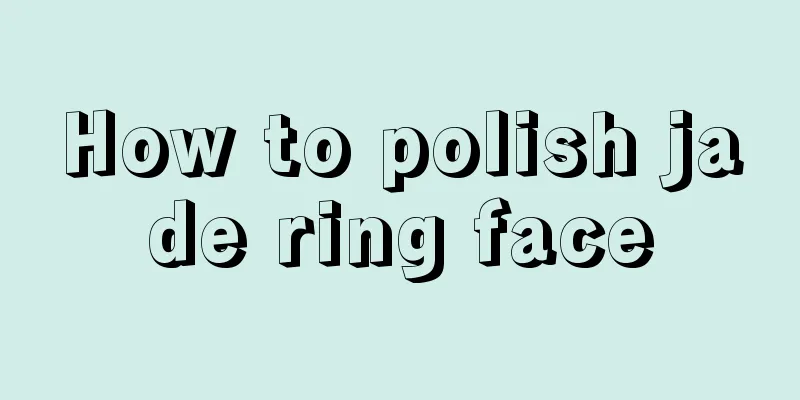Seven common misunderstandings in the process of jade appreciation. Have you made any mistakes?

|
Time has left traces of the years on jade, but it cannot erase people’s love for jade. However, loving jade does not mean understanding jade. According to the experiences of many friends that Bihaitong knows, most people have misunderstandings in jade appreciation. Only by getting rid of these misunderstandings can we better appreciate the beauty of jade. Now let’s take a look at the seven common misunderstandings in the process of jade appreciation. Myth 1: The more uniform the green, the better In the market, you can often see some jadeite that is emerald green all over, with bright color and very even distribution. In fact, most of such jadeite is fake. The interior of jade is composed of a collection of granular minerals, so its green color is locally distributed, and there is a boundary between green and non-green. Misunderstanding 2: Learning identification technology on paper Jade optimization and processing technology is changing with each passing day, but the knowledge in books is often lagging behind. If jade lovers buy B-grade or fake jade according to the identification methods in books, it may be because the market has invented new processing technologies that have not yet been summarized and published in books. Therefore, we cannot rely solely on paper talk. Myth 3: The ones that don’t change color are A-grade goods Some dyed jade can keep its bright color for up to 10 to 20 years. However, some A-grade jadeite in red or yellow colors may change color in a relatively short period of time, mainly due to changes in the chemical elements inside the jadeite. Myth 4: Green jade is good Emerald green jade is the best quality among A-grade jade, but not all jade is green. There is a kind of jade that forms a bright "jade" color due to the infiltration of iron. If such jade has high transparency and good texture, it will also be popular in the market. Myth 5: The older the jade, the better We often encounter many collectors who are particular about collecting "ancient jade", but there is no distinction between "ancient" and "modern" jade collection. Jade was introduced into China during the Qing Dynasty. At that time, there were not many jade raw materials and the identification ability was poor, so the quality of jade that was older was relatively poor. Myth 6: The more complex the process, the better “Simplicity is beauty.” Many high-quality jades are often made into very simple bracelets or ring faces without any carving; while some jades with impurities or cracks are often carved into figures or scenes by skilled craftsmen to cover up their natural imperfections. Myth 7: The rarer the item, the more valuable it is Natural minerals sometimes form very special patterns. For example, some minerals are arranged in shapes similar to animals or mountains and rivers. Some collectors often hype this kind of jade as a rare treasure. In fact, in addition to being rare, this kind of jade must conform to aesthetic principles and have good texture to be truly "valuable". fcgc66 fcpf18 |
>>: There are 7 grades of jadeite. Do you know them all?
Recommend
The ultimate way to play with jade inlay will open your eyes
Following the footsteps of fashion, Jade is a sym...
The secret of jade “water adjustment” is revealed, a must-read for jade lovers!
The concept of jade water is relatively complex. ...
The value of jadeite has skyrocketed! The best investment for next year is actually a ring?
As the saying goes, "Hide gold in troubled t...
What are the jade pendants for men? Jade pendants suitable for men
When mentioning jade, many people will associate ...
Use a thin layer of yellow mist to carve landscape-themed pendants, and the finished product is also beautiful
If we can dig out the characteristics of ordinary...
Teach you how to choose jadeite from scratch - correctly distinguish between A, B, C goods and jadeite quality
Many friends have told me that they like jade mor...
Isn’t jadeite jade? What is the difference between jadeite and jade?
Jadeite is a type of jade, but jade includes a wi...
Common identification methods of jadeite
Jade is known as the king of jade. Chinese people...
Although the jade has only a thin layer of yellow mist, the carving is very delicate and charming.
A very ordinary piece of Damakan yellow skin mate...
Why are most top-grade jadeite plain?
Careful jade lovers may find that the real top-gr...
Experienced experts prefer "plain jade", so is it still possible to buy jade with complex carvings?
Jade pendants are the most familiar jade ornament...
White jade is not valuable? That's because you don't know this kind of jade!
In fact, what I want to introduce to you today is...
Simple and practical methods for daily identification of jadeite authenticity
1. Knock on the jade and listen to the sound. Tap...
Just look at how beautiful jade is.
There is an old saying: A gentleman never leaves ...
Appreciation of exquisite jade carvings
Jade mainly focuses on eight aspects: type, water...









